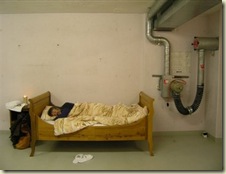 The best takedown of the Swiss we know - because why would anyone want to take down the Swiss, after all? - comes from Orson Welles in The Third Man:
The best takedown of the Swiss we know - because why would anyone want to take down the Swiss, after all? - comes from Orson Welles in The Third Man:
Don't be so gloomy. After all, it's not that awful. Like the fella says, in Italy for 30 years under the Borgias they had warfare, terror, murder, and bloodshed, but they produced Michelangelo, Leonardo da Vinci, and the Renaissance. In Switzerland, they had brotherly love - they had 500 years of democracy and peace, and what did that produce? The cuckoo clock.
Cuckoo clocks and now a way to recycle remnants of the cold war into something unique and just a little bizarre. Here's the complete writeup from World Nuclear News, which they took from Der Spiegel.
The world's first "zero-rated" hotel - a former underground nuclear bunker - is set to open in Sevelen, Switzerland. The abandoned bunker has been transformed into a budget hotel by twin brothers Patrik and Frank Riklin with the motto "less is more": it has not been painted, the beds are from a nearby condemned hospital and hot water is not guaranteed - but what would you expect for just $9 to $13 per night?
Patrik insists that the hotel's stark Cold War atmosphere is "damned comfortable." A monitor within the bunker gives guests in the windowless hotel their only view of the outside world.
One condition from the Swiss military is that the bunker be ready at all times to revert back to its original function within 24 hours.
A group of guests gave the 54-bedded hotel a trial run last week. The hotel can only start commercial operation if given approval by the town in November. However, the Riklin brothers are already setting their sights on setting up a chain of such hotels. "People could hike from bunker to bunker," Patrick said. "Bunkers will definitely go down well with Japanese tour groups," he added.
Clearly a good locale for your next horror film featuring a twitchy desk clerk who hasn't left the bunker in 40 years and the mewling protoplasmic ick in room 666 that he calls Mother.
To quote a minor character in the Third Man who struggles with his English, "He is now [points up] in hell, or [points down] in heaven."
Sounds like heaven.
Picture of the bunker hotel form the AP. Well, at least the room - er, space - looks big, not that common in Europe.
While Graham Greene wrote the screenplay for The Third Man, it's been acknowledged that Orson Welles wrote the Cuckoo Clock speech himself - remember, though, that Welles is playing the villain, Harry Lime, so we may assume he meant the speech to be Lime's cheerful cynicism, not a reflection of Welles' own feelings.
Comments